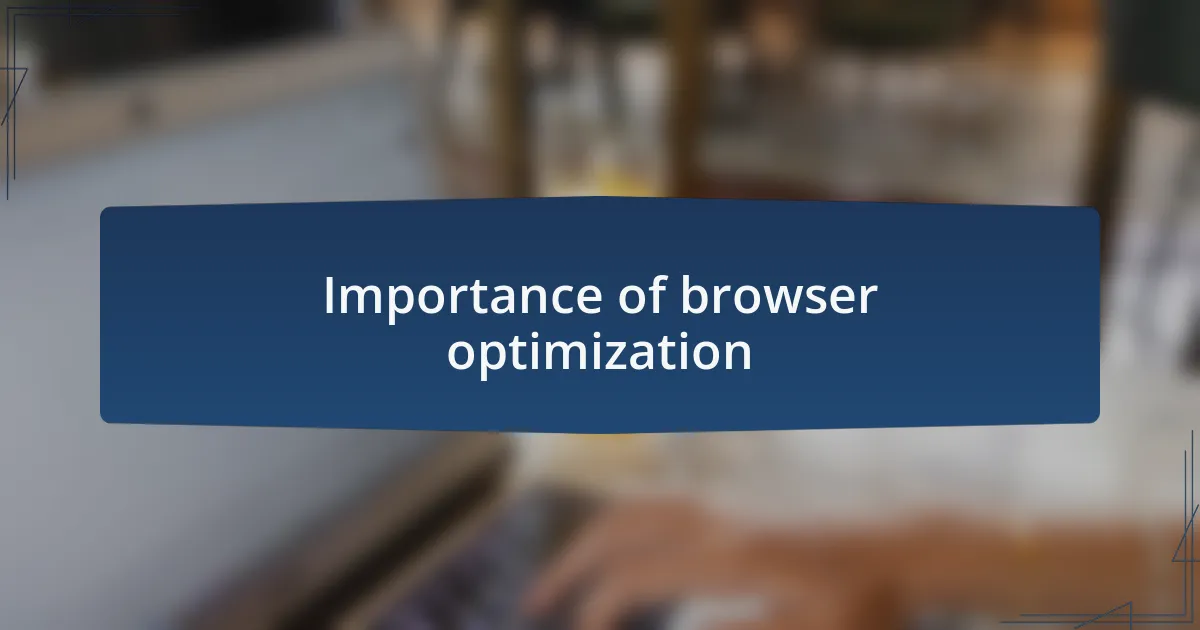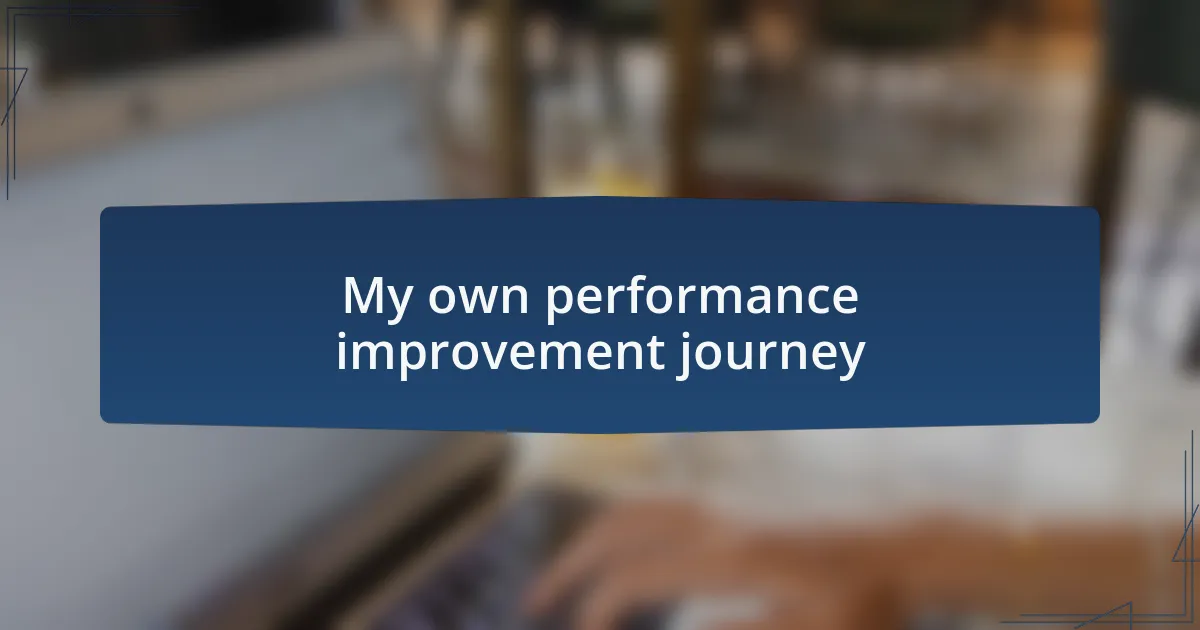Key takeaways:
- Regularly optimizing browser settings, such as clearing cache and managing extensions, significantly enhances loading speed and overall performance.
- Keeping the browser updated is crucial for security and smooth operation, as outdated versions can lead to vulnerabilities and slowdowns.
- Using performance assessment tools, like WebPageTest and Chrome’s Task Manager, helps identify bottlenecks and improve browsing efficiency.
- Implementing a regular maintenance routine for your browser can lead to noticeable improvements in speed and productivity.

Understanding web browser performance
Web browser performance hinges on several factors, including loading speed, memory usage, and responsiveness. I remember a time when my browser felt sluggish, and it frustrated me to no end. It was as if every tab I opened added another brick to the wall of my productivity, making me question, “Why is this happening?”
The heart of understanding performance is to realize how extensions and plugins can either enhance or hinder your browsing experience. I once had a favorite extension that promised to streamline my workflow, but it ultimately crashed my browser more often than not. This experience taught me a valuable lesson about being selective with add-ons and regularly evaluating their impact.
Finally, let’s not overlook the importance of regular updates. I often find it surprising how many people ignore update prompts. I used to be one of them until I learned that outdated browsers could be vulnerable to security risks and performance issues. Now, I embrace updates like a refreshing breeze, knowing they can significantly enhance my overall browsing experience.

Importance of browser optimization
Optimizing your browser isn’t just a techy task; it directly impacts how efficiently you navigate the web. I recall tuning my browser settings to prioritize speed, which made a world of difference. It’s fascinating how a few adjustments can transform frustration into seamless browsing, leaving you wondering why you didn’t do it sooner.
When I finally confronted the need to clear my cache and cookies regularly, it felt like lifting a heavy weight off my shoulders. The difference was palpable; websites loaded faster and my browser felt lighter. Have you ever experienced that liberating moment when everything works just as it should? It’s those small optimizations that create a more enjoyable and productive environment.
Moreover, browser optimization is crucial for maintaining security. Each time I optimize, I remind myself about those moments of vulnerability I faced with outdated settings. Knowing that I’m actively protecting my data while browsing gives me peace of mind. Isn’t it empowering to take control of your digital space and ensure a smooth, secure experience?

Common factors that affect performance
When I started noticing my browser lagging, I realized that too many open tabs were a significant contributor. Each tab consumes memory, which can slow down performance considerably. Have you ever clicked on a tab, only to watch it take ages to load? I’ve been there, and it’s frustrating.
Another factor that surprised me is the impact of outdated plugins and extensions. Sometimes, I would add tools to enhance my browsing experience, only to find they were causing more harm than good. Identifying and uninstalling unnecessary extensions felt like decluttering my digital space, making everything run smoother and faster. Doesn’t it feel great when you finally let go of what doesn’t serve you?
Lastly, bandwidth usage plays a crucial role in browser performance. I remember a time when my internet connection was slow due to multiple devices hogging the bandwidth. The moment I restricted the number of connected devices, my browsing experience transformed. Have you checked if your network is being overwhelmed by too many connections? I find that even small adjustments can lead to surprisingly significant improvements.

Tips for improving browser speed
When I decided to streamline my browser, one of my first steps was clearing its cache. I still remember the moment I clicked through to my settings and wiped away all that stored data; it felt like dusting off a shelf after months of neglect. A clean cache can dramatically speed up loading times, and it’s a simple fix that often gets overlooked. Have you ever wondered how much memory your browser collects over time?
Another important tip is to check for any updates available for your browser. I recall how I hesitated to update mine, thinking they were merely cosmetic changes. But once I took the plunge and updated it, I was pleasantly surprised by the speed enhancements and new features. It’s like giving your smartphone a new lease on life—sometimes, that little notification can unlock a better experience.
Finally, consider using a lightweight browser if you often find speed to be an issue. I once switched to a more minimalist browser for my work-related tasks, and it was like switching from a sluggish pickup truck to a sleek sports car. The difference was astoundingly noticeable in my productivity and enjoyment while browsing. Have you ever thought about how the choice of a browser can impact your daily routine?

Tools for assessing browser performance
When it comes to assessing browser performance, I’ve found that tools like WebPageTest and GTmetrix are invaluable. I remember the first time I ran my favorite site through WebPageTest; the detailed results opened my eyes to how many elements were slowing it down. It’s like having a personal mechanic for your browser, revealing not just the speed but also the specific resources that might be causing a bottleneck. Have you ever seen those breakdowns and thought about how they could guide your optimization efforts?
Another tool worth exploring is the built-in performance monitoring features of browsers like Chrome. I was amazed when I first accessed the Chrome Task Manager, where I discovered which tabs were hogging memory and CPU. It was eye-opening to see the impact of extensions I didn’t even realize were dragging my performance down. This made me wonder, how often do we overlook the hidden costs of our browser habits?
Finally, while looking into browser performance, I highly recommend Lighthouse, a tool that evaluates performance metrics, accessibility, and more. I ran a site through it and was stunned by the actionable insights it provided—almost like receiving a personalized health check for my browsing experience. Reflecting on it, I realized that investing a little time with these tools could lead to significant enhancements in my day-to-day browsing. What insights have you gained from assessing your own browser using these tools?

My own performance improvement journey
As I dove deeper into improving my browser’s performance, I embarked on a journey that was both surprising and enlightening. One day, while experimenting with my browser settings, I discovered how disabling certain extensions improved load times dramatically. It felt like shedding unnecessary weight—the difference was instantly noticeable, like exchanging a heavy backpack for a lightweight messenger bag. Have you taken a moment to consider which extensions might be slowing you down?
Reflecting on my experience, managing tabs became a critical part of my improvement strategy. I clearly remember one afternoon when I had more than twenty tabs open, and my browser crawled to a halt. After that frustrating moment, I adopted a more disciplined approach to tab management using tools like OneTab, which consolidates open tabs for easier access. This simple change not only enhanced my browser’s speed but also brought a newfound sense of clarity to my online workflow. I’m curious, have you ever felt overwhelmed by too many open tabs?
Finally, I started integrating regular browser maintenance into my routine. Once a month, I set aside time to clear out cache and cookies—an essential step that I used to overlook. The first time I performed this clean-up, it was shocking to see an immediate boost in performance. My browser felt rejuvenated, almost like it was breathing anew. That experience taught me the importance of maintenance. How often do we neglect the basics in our digital lives that could lead to significant improvements?

Results of my optimizations
After implementing these optimizations, I was genuinely astounded by the transformation. My browser not only loaded pages faster, but I also noticed a remarkable drop in memory usage. I vividly recall feeling a wave of relief as I navigated through web pages with fluidity that I hadn’t experienced in years. Isn’t it incredible how such seemingly small changes can lead to significant advancements in performance?
Another notable change was in my overall productivity. I found myself completing tasks more efficiently, thanks in part to streamlined tab management and reduced distractions from heavy extensions. One afternoon, as I breezed through a project, I realized I was saving an hour of work that would have been previously lost to lagging pages and constant refreshes. Have you ever experienced that moment when everything just clicks? It truly makes a difference.
Moreover, my regular maintenance routine revitalized my browsing experience. The process of deleting cache and cookies became a ritual I looked forward to, like a breath of fresh air for my digital space. I felt empowered knowing I was taking control of my browser’s performance. How satisfying is it to witness your own efforts translating into tangible improvements?